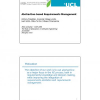675 search results - page 11 / 135 » Using Fairness to Make Abstractions Work |
ASPDAC
2005
ACM
13 years 9 months ago
2005
ACM
Abstract— As technology scales to 0.13 micron and below, designs are requiring buffers to be inserted on interconnects of even moderate length for both critical paths and fixing...
ICSE
2012
IEEE-ACM
11 years 9 months ago
2012
IEEE-ACM
Abstract—Software testing is an expensive and time consuming process, often involving the manual creation of comprehensive regression test suites. However, current testing method...
ICSE
2008
IEEE-ACM
14 years 7 months ago
2008
IEEE-ACM
ion-based Requirements Management Anthony Finkelstein, University College London Leah Goldin, Afeka-Tel Aviv College of Engineering ROA workshop - ICSE 2006 of Abstraction in Softw...
POPL
1989
ACM
13 years 11 months ago
1989
ACM
raction that a programming language provides influences the structure and algorithmic complexity of the resulting programs: just imagine creating an artificial intelligence engine ...
GECCO
2004
Springer
14 years 24 days ago
2004
Springer
Abstract. Human-based genetic algorithms are powerful tools for organizational modeling. If we enhance them using chance discovery techniques, we obtain an innovative approach for ...

